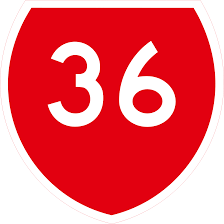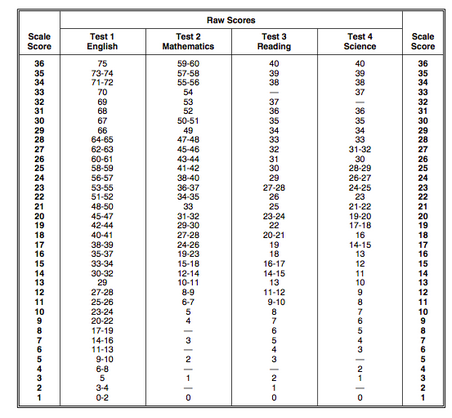
Lots of students strive for that perfect 36 ACT composite score. You might think you need a completely perfect test, but that's not the case. You have some leeway in how many questions you can miss and still get a 36.
In this article, I'll explain my research into official ACT grading scales, and I'll tell you how many questions you can get wrong and still get that 36.
How Is the ACT Scored?
To understand how many questions you can get wrong and still get a perfect score, you need to understand how the ACT is scored. For a more in-depth explanation, check out our other article: How is the ACT Scored?
In brief, the ACT is made up 4 sections: Math (60 questions), Reading (40 questions), Science (40 questions) and English (75 questions) plus Writing (1 Essay). The essay is not factored into your overall composite score, so I am not going to discuss it further in this article. If you're curious about the essay, read our other article: How to Write an ACT Essay: Step by Step Example.
Unlike the SAT, you do NOT get points deducted for wrong answers, so it is to your advantage to bubble in any questions you can’t answer since you won’t be penalized for wrong answers. For each section, you are given a raw score, which is simply the number of questions you answered correctly, and then that raw score is converted into a scaled score.
The raw score to scaled score conversion varies each ACT test date, but the ACT provides a table in their Preparing for the ACT guide that estimates how each section’s raw scores will be converted into scaled scores. Here it is:

Once you have the scaled scores for each section, you simply add the 4 section scores together and divide by 4 (aka averaging) and then you have your composite score. If your score ends up with a decimal, it is rounded. i.e. if it is a 35.4, it is rounded to 35, and if it is 35.5, it is rounded to 36.
Now let's get back to the original question.
How Many Questions Can You Miss and Still Get a Perfect 36 Composite Score?
The answer is a little complex (and I will explain it further), but you can typically get between 0 and 2 questions wrong in total across all four sections. The reason the answer is more complex is that the scoring for each section of the test is different, and the scoring for each section varies by test date (as you can see in the chart above and as I will explain further below).
If you want to get a 36, you need to get a 36 on at least 2 of the sections. Here are the breakdowns:
(36+36+36+36) / 4 = 36
(36+36+36+35) / 4 = 35.75 (rounds up to 36)
(36+36+35+35) / 4 = 35.5 (rounds up to 36)
(36+36+36+34) / 4 = 35.5 (rounds up to 36)
NOTE: you cannot get a 33 on any individual section if you want to get a composite score of 36.
As I said, the scoring of each section varies by test date. So, to give you a better idea of the typical number of questions you can get wrong for a 36 in each section, I have analyzed 5 different ACT score charts:
| Section | Test 1 | Test 2 | Test 3 | Test 4 | Test 5 |
| English | 0 | 0 | 0 | 0 | 0 |
| Math | 0 | 0 | 0 | 0-1 | 0 |
| Reading | 0 | 0-2 | 0 | 0 | 0 |
| Science | 0 | 0 | 0 | 0 | 0 |
You can see that to get a 36 in English, Reading, Math or Science, you typically need to get 0 wrong. Occasionally, a test will allow 1 or 2 mistakes, but that is a rarity, so you should plan for 0 wrong to get a 36 in any of the sections.
Since you can get up to two 35s on individual sections (if you get 36s on the other sections, as I showed above), I have also analyzed the same tests for the number of questions you can get wrong for a 35 in each section:
| Section | Test 1 | Test 2 | Test 3 | Test 4 | Test 5 |
| English | 1 | 1-2 | 1-2 | 1-2 | 2-3 |
| Math | 1 | 1-2 | 1 | 2-3 | 1-2 |
| Reading | 1 | 3 | 1 | 1 | 1 |
| Science | N/A* | N/A* | 1 | 1 | 1 |
*Science sections labeled N/A means you are not able to score a 35 on those tests in the Science section. 1 question wrong drops you to a 34 in Science on those tests.
Since the scoring varies so much between test dates for each section, to be safe, you should aim to get at most 1 wrong in any section to get a 35. While you may, in fact, end up being able to get more wrong, you cannot be sure have harsh or easy your test grading will be and should plan for harsher grading.
Since you can get up to one 34 on an individual section (if you get 36s on the other sections, as I showed above), I have also analyzed the same tests for the number of questions you can get wrong for a 34 in each section:
| Section | Test 1 | Test 2 | Test 3 | Test 4 | Test 5 |
| English | 2 | 3-4 | 3-4 | 3-4 | 4 |
| Math | 2 | 3-4 | 2 | 4-5 | 3 |
| Reading | 2 | 4 | 2 | 2 | 2 |
| Science | 1 | 1 | N/A* | 2 | 2 |
*The science section labeled N/A means you are not able to score a 34 on that test in the Science section. 2 questions wrong drops you to a 33 in Science on that test.
If you are aiming to get a 34 on 1 section and 36 on the rest to get a 36 composite score, you should aim for at most 2 wrong on that section. As I said before, while the scoring varies, and you could technically have gotten up to 4-5 wrong on certain sections on certain test dates to get a 34 on that section, you need to plan for the worst case scenario, so plan that you will get a 34 if you get 2 wrong.
Any way you calculate it, you can miss or skip a maximum of 2 questions to get a 36 composite score. That's not a lot, so if you're hoping for a perfect score, you will need a lot of practice.
What Does This Mean If You're Aiming for a 36?
For the whole test, you need to have the pacing down and make sure you can finish. You cannot afford to miss or skip many questions, so first and foremost make sure the timing will not be a problem for you.
You should determine which sections are your strongest and weakest. For example, if you are excellent in Math, Science, and Reading and weaker in English, focus on getting the Math, Science, and Reading close to perfect to get a 36, so you can afford to miss or skip 3 or 4 in English and get a 34.
What's Next?
Need help preparing for the ACT? Check out guides to the ACT Reading, Math, English, and Science sections. Taking the ACT very soon? Read our guide to cramming for the test.
Not sure where you want to go to college? Check out our guide to finding your target school. Also, figure out your target ACT score.
Thinking about getting a job while in high school? Check out our guide to the 8 best jobs for teens and learn how to find yours!












